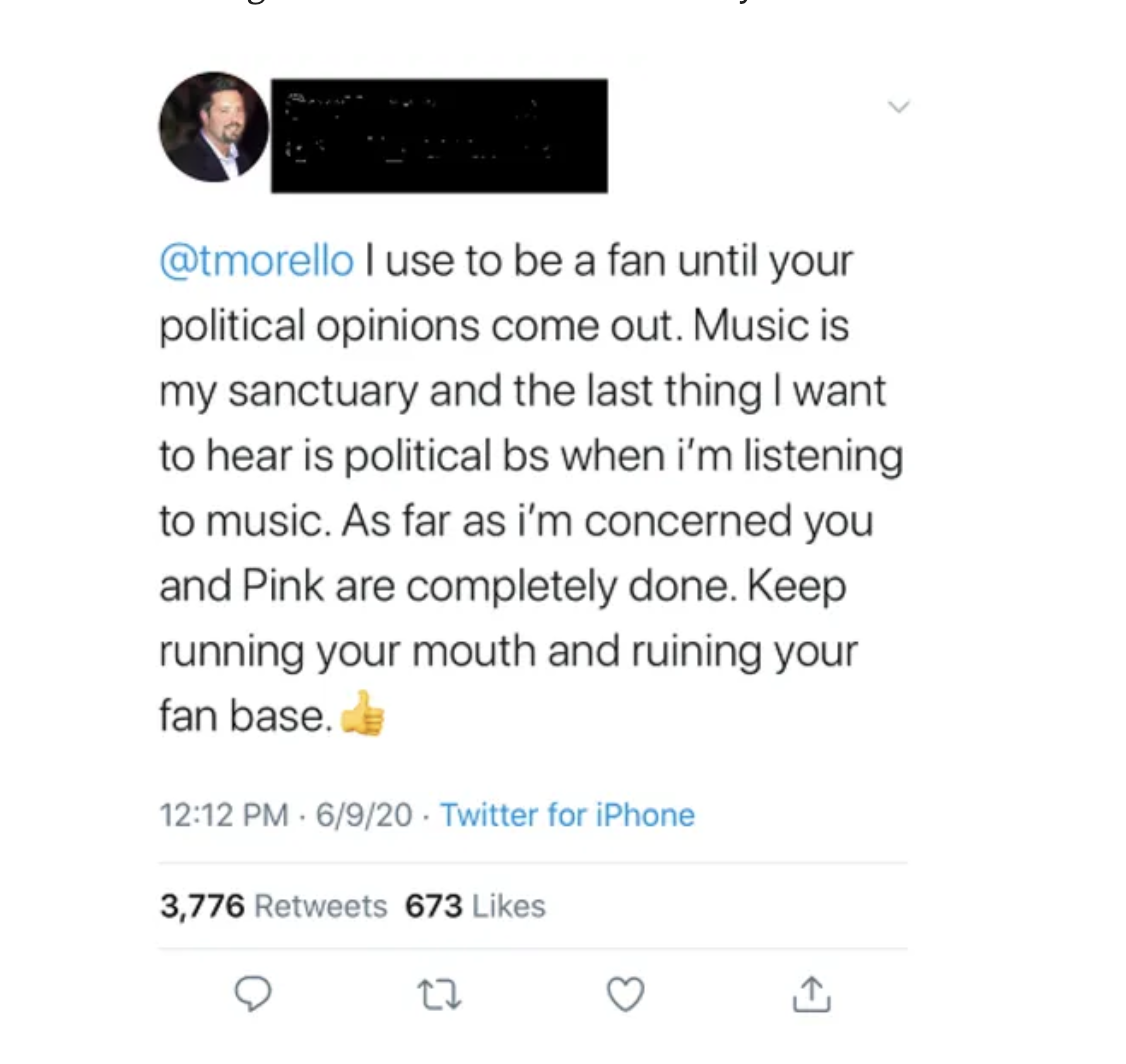
“I, Dancing Bear,” a song by an obscure folk artist who goes by the name Birdengine, begins thus:
There are some things that I just do not care to know
It’s a lovely little tune, if maudlin and macabre are your thing, a song one might almost call anti-political. It is the art of solipsism, denial, an inwardness that dances over the abyss of pure self, navel gazing for its own sake. It is Kafka-esque, pathetic, and hysterical. I love it.
My appreciation for this weird, outsider New Romanticism does not entail a belief that art and culture should be “apolitical,” whatever that is.
Or that artists, writers, musicians, actors, athletes, or whomever should shut up about politics and stick to what they do best, talk about themselves.
The idea that artists should avoid politics seems so pervasive that fans of some of the most blatantly political, radical artists have never noticed the politics, because, I guess, they just couldn’t be there.
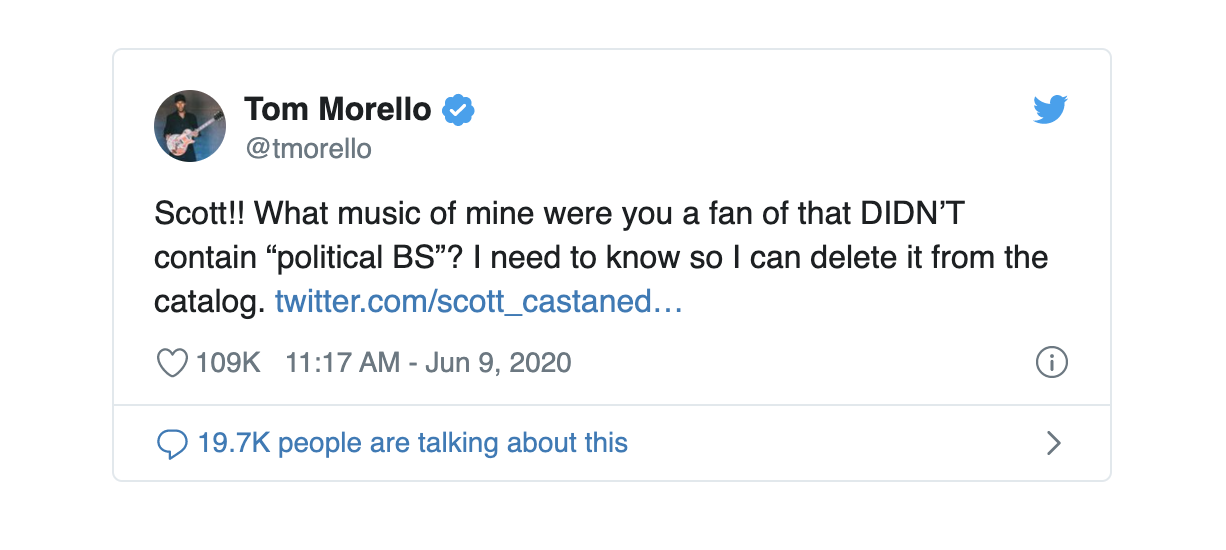
One such fan just got dunked on, as they say, a whole bunch on Twitter when he raged against Tom Morello for the “political bs.”
That’s Tom Morello of Rage Against the Machine, whose debut 1992 album informed us that the police and the Klan work hand in hand, and that cops are the “chosen whites” for state-sanctioned murder. That Rage Against the Machine, who raged against the same Machine on every album: “Bam, here’s the plan; Motherfuck Uncle Sam.”
The poor sod was burned so badly he deleted his account, but the laughs at his expense kept coming. Even Morello responded.
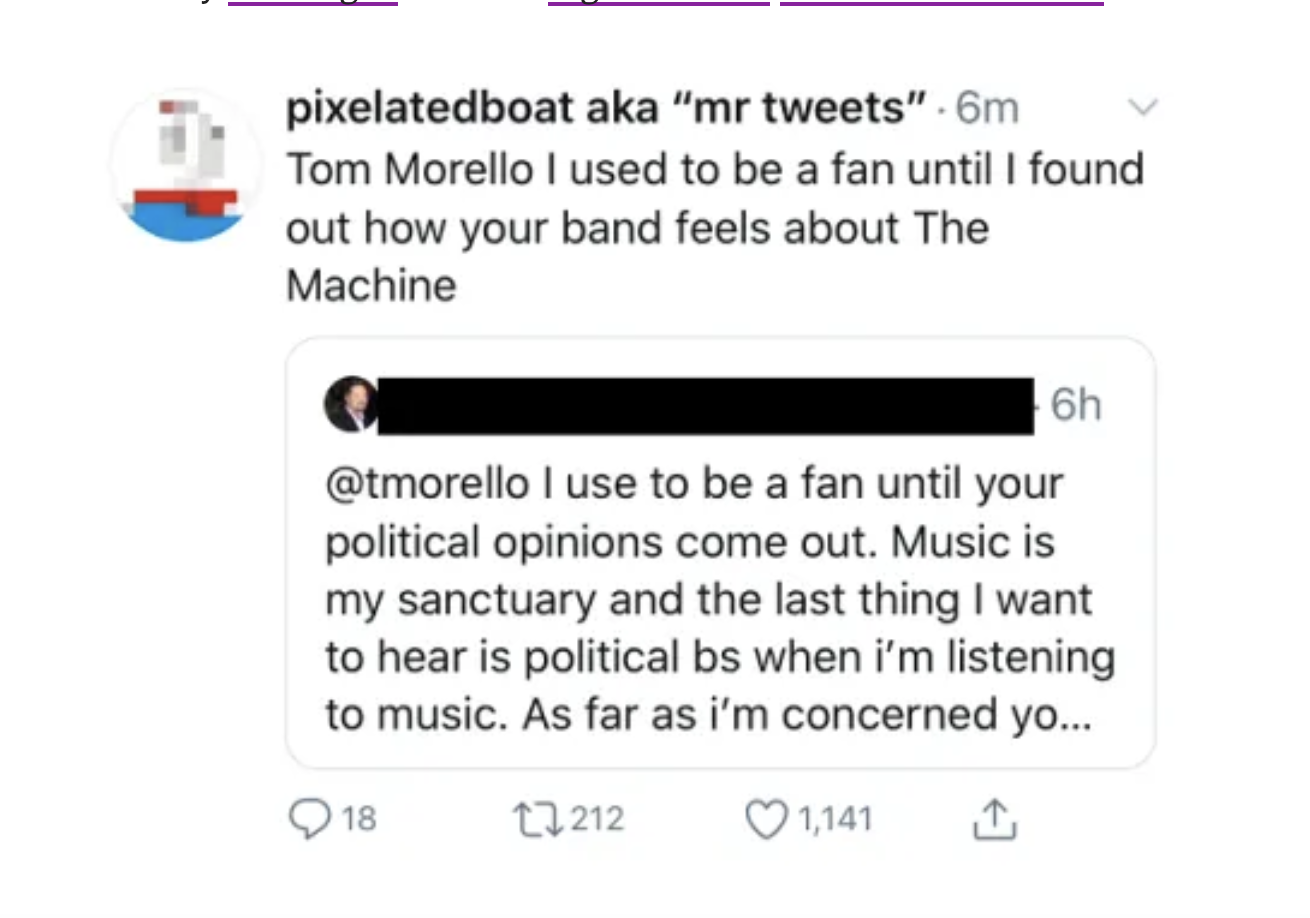
Why? Because the disgruntled former fan is not just one lone crank who didn’t get it. Many people over the years have expressed outrage at finding out there’s so much politics in their culture, even in a band like Rage that could not have been less subtle. Many, like former lever-puller of the Machine, Paul Ryan, seem to have cynically missed the point and turned them into workout music. Morello’s had to point this out a lot. (Ditto Springsteen.)
This uncritical consumption of culture without a thought about icky political issues is maybe one reason we have a separate political class, paid handsomely to do the dirty work while the rest of us go shopping. It’s a recipe for mass ignorance and fascism.
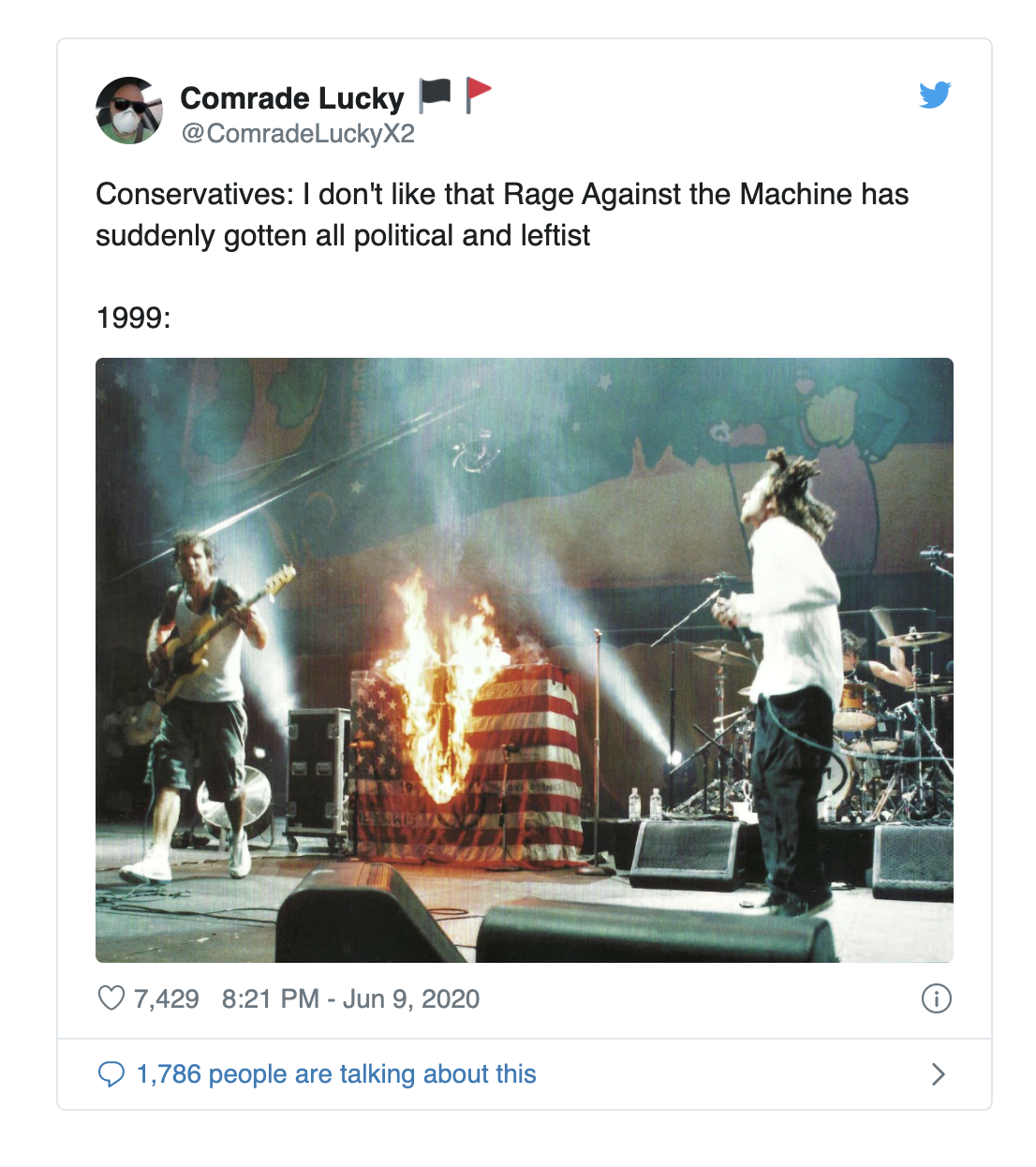
You might think me crazy if I told you that the CIA is partly responsible for our expectation that art and culture should be apolitical. The Agency did, after all, follow the lead of the New Critics, who excluded all outside political and social considerations from art (so they said).
Influential literary editors and writing program directors on the Agency payroll made sure to fall in line, promoting a certain kind of writing that focused on the individual and elevated psychological conflict over social concerns. This influence, writes The Chronicle of Higher Education, “flattened literature” and set the boundaries for what was culturally acceptable. (Still, CIA-funded journals like The Paris Review published dozens of “political” writers like Richard Wright, Gabriel Garcia Marquez, and James Baldwin.)
Then there’s the whole business of Hollywood film as a source of Pentagon-funded propaganda, sold as innocuous, apolitical entertainment….
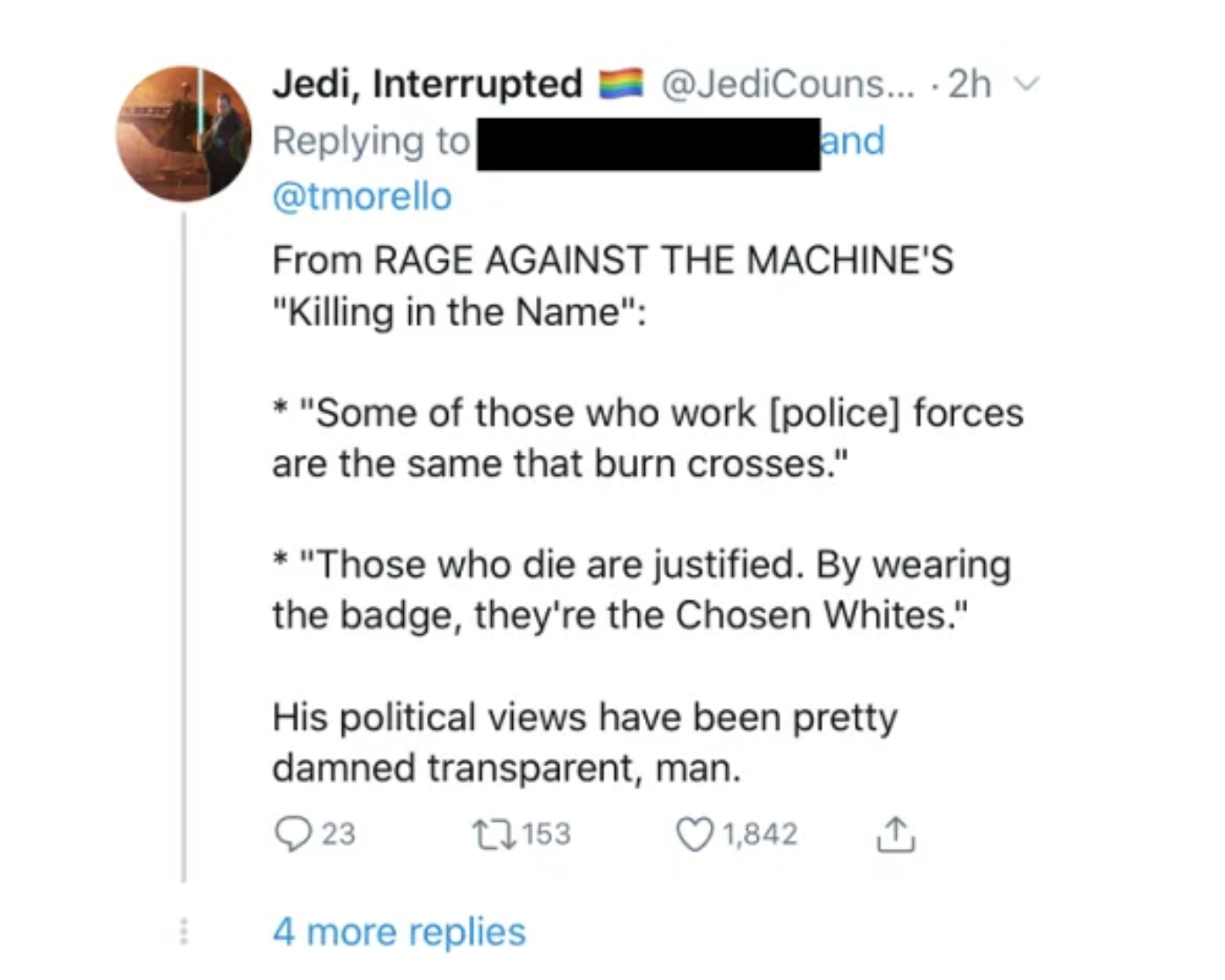
When it comes to journalism, an ideal of objectivity, like Emerson’s innocent, disembodied transparent eye, became a standard only in the 20th century, ostensibly to weed out political bias. But that ideal serves the interests of power more often than not. If media represents existing power relationships without questioning their legitimacy, it can claim objectivity and balance; if it challenges power, it becomes too “political.”
The adjective is weaponized against art and culture that makes certain people who have power uncomfortable. Saying “I don’t like political bs in my culture” is saying “I don’t care to know the politics are there.”
If, after decades of pumping “Killing in the Name,” you finally noticed them, then all that’s happened is you’ve finally noticed. Culture has always included the political, whether those politics are shaped by monarchs or state agencies or shouted in rap metal songs (just ask Ice‑T) and fought over on Twitter. Maybe now it’s just getting harder to look away.
Related Content:
The Politics & Philosophy of the Bauhaus Design Movement: A Short Introduction
Love the Art, Hate the Artist: How to Approach the Art of Disgraced Artists
Josh Jones is a writer and musician based in Durham, NC. Follow him at @jdmagness


That one tweet that kills your twitter account. I’m glad I didn’t have twitter when I was young and stupid. I don’t have it now because I’m old and wise enough to know how stupid I can be.
When you suddenly realise nobody listens to your lyrics
You obviously do not have a clue about RATM or their real fans.
Solid article.
I am a 65 year old who is a big fan of Rage. The first time I heard their music I heard what they were trying to get across. The lyrics express what most people feel but are afraid to say it. Go back and listen to the 60’s-70’s music, the time of Vietnam. You will hear songs and lyrics that express the same points of view but in a different era. The Machine is getting more and more out of control, look at what or who most countries have for leaders. Dictatorial leaders are on the rise under the guise as to one who is the best for their country. I could go on,but one has to stop somewhere. Rage.… Keep Raging.
https://m.youtube.com/watch?v=iragyhVgLOg
Who are these “dictatorial leaders??”. For me, they are: Nancy “Psycho” Pelosi, Chuckie “Upchuck” Schumer, Alexandria Ocasio-Cortez, Andrew Cuomo, Hillary “Liar” Clinton, Elizabeth “Pocahontas” Warren, Joe “Touchy Feely” Biden, etc etc!
The funniest post I’ve seen related to this:
“what machine you thought they be raging against… The dishwasher??
Great, Rage on against tyranny. But if Morello thinks mobs of spoiled brats looting Target’s electronic aisle is the answer, then he’s in for a big surprise. #therussianrevolution
I’ve always known that Rage, Tom and Zack, et al, have very, very shitty political opinions and they look for and often find corruption and racism where there is NONE.…
But, I’ve always liked their music despite that fact. The beats, the rhythm, Tom’s ability to make a guitar sound like scratching and sampling.….ALL would be just as great without the radical anti-American theme of the lyrics. It’s entirely possible to love the delivery but hate the message!
The best message here. Trump 2020.
Yup, 2020. 20 years for obstruction and 20 years for bribery, lying, deliberately overcharging tax payers, etc… Imp45
Trump’s number 1 voting demographic…non-college educated white people. Enough said.
It’s sad that a lot of people have blinders on their eyes and crap in their ears, oblivious to what’s really going on. But yet want to talk down on someone who’s trying to open the eye’s of those that are hearing the music. But not listening to the message. Keep on RAGING.
The mainstream media polarization of the left and the right in our bogus two party system, is on purpose to devide us. D.K. you really haven’t been paying attention. Republican, Democrat it doesn’t matter who gets in, your rights are chiseled away at or stripped forever. Trump talks a good game but we have been duped. If Trump rolls out the military in downtown America you will stand and cheer. Wake up before it’s too late.
I loved rage when they first came out in the early 90’s and they were relevant to the underground culture of the time. They pushed the envelope as far as lyrics and sounds go and I haven’t heard a band like them since. As a teenager their lyrics spoke to me and I could relate to the angst they portrayed. I learned a lot by looking up the meanings behind what they were saying, and in a way they changed my life by making me take an active role in just trying to make sense of politics.
Cut to now, some 20yrs later, and its not quite the same story. Politics, and culture in general today has changed, especially among the youth, it is nothing but a marketers wet dream…almost thanks to bands like rage. There was never really a big youth demographic that aimed politics and/or political music like rage did when they 1st came out. And over the years, each generation of kids that came after has been indoctrinated and conditioned by corporate conglomerates who have turned things like protesting for a cause into a billion dollar commercial campaign where they pretend to be “woke” in order to sell crap to kids.
And with rage making a “comeback”, and the mainstream media paying alot more attention to them this time because now it suits their marketing agenda, I think they should’ve just stayed away and kept the last shred of authenticity they still had. Instead I see things like them charging outrageous prices for shows, which they say most of it goes to “charities” or whatever, but even if they did, the only people who are able to afford to go will be the rich white upper class people they’ve been so wholeheartedly “raging against” all these years.
So sorry Tom and the rest of the guys, but this is one fan who, always knew your politics and at one time raged right along there with you as a kid, but now wish you’d just go away and not participate in this so called “uprising”, mostly because its being led on by the machine itself, that I thought you were against?
But then again, rage has always been hypocrites when it comes to these things, its just more obvious and pathetic than ever before. I mean the whole “anti-capitalist” thing just doesn’t have that bite to it anymore coming from 4 dudes who made millions off of it. You just know when things like Amazon are “sponsers” for these “protests” and rage(before covid) was set to play at places like “Citibank” arena, that their original fire they once had has been thoroughly extinguished. Sad times…
The lyrics are the main reason I love RATM. The band’s name is a real good reason to expect that their music is not K‑Pop. The ignorance of this country is amazing.
Rage until I die!
Nope. It is you that is anti American. Only a white supremacist says people find racism where there is none. I bet you believe those NYPD pig thugs who lied about being poisoned. Incorrect, you are the one who hates America. If you are too dumb too understand the lyrics you don’t deserve top listen to RATM. You have to be really stupid to love the music but hate the message.
Anyone who supports the orange chimp at this point is a danger to the country.
There is no polorziton. In a real country Democrats would fit more in left with center right conservitives.
You really are a special kind of stupid, aren’t you?
I’ve always been a RATM fan and always will till the day I die… or until RATM sell out to THE MACHINE which I hope they never will…
I am so so disappointed in rage ! I can see clearly now what there band is truly about!! I was dumb and didn’t see that they represent socialism ! That is a big wake up.… that’s there game.. I will trash every thing I own that represents this band.. wow I see them at Woodstock 99 hmmmmmmm yes now the truth is out!! There words exactly.….… Fuck you we aren’t going to do what you told us.….. Get out of OUR country for good live in communism is obviously what you want…
You got one part right. You are dumb. You can read, write, or listen. And you can’t think for yourself.
The truth was there for anyone to see, and for 28 years you were to blind to notice.
You have no brain, you have to be told what to do, to think.
RAtM was talking about people like YOU this whole time, lmao.
I used to love RATM but now they are part of that machine promoting division and hate, which is actually the main goal of the machine a the moment.
Late to this article but I was really influenced by RATM in my teenage years. They are the reason I hate both the republican party and the democratic party, corporate greed and police.
It’s sad to see Tom blowing the democrats.
If you think their lyrics were fond of red or blue you weren’t listening.
Why haven’t we gotten healthcare for the people yet? The democrats aren’t pushing for it is why. AOC is a fraud she was supposed to push the Dems to the left and get us healthcare. Now she calls Pelosi “Mama Bear”. Great, “now’s not the time” to push for a vote on healthcare but it is the time to push for trillions for infrastructure?
We rank somewhere around 13th in the world in infrastructure, I think people having healthcare is a little more important.
So sick of everyone’s blind loyalty to “their” side.
I’m here to say f**k your side unless you are on the side of the people, and that side sure as hell isn’t the democrats or the republicans. Quit fighting with each other and wake up. Let’s make these bastards who have healthcare for life serve and listen to us like they’re supposed to.
They know you’ll never criticize their side because you’re to busy hating the other side. Stop worrying about how messy your neighbors house is when you need to clean yours. They’re both owned by the same corporations.
I don’t give a s**t if you don’t agree with me because just like you and your blind support for people who don’t care about you, I cannot be swayed.
Destroy the 2 party system, it no longer serves us.
Old hippie/New fan…been outragedforalmost a milineum!you are tight! N right…luv U!
Takes a Trump supporter to make an ignorant ‘observation’ like that. Maybe he doesn’t want to hear it because it speaks directly to his bigotry and all the evil heartless political pundits whom he worships who love keeping all their favorite so-called ‘undesirables’ oppressed. RATM has amazing messages in their music that EVERYONE and every generation NEEDS to hear. I don’t even care for that genre of music but I feel rage is THEE BEST rock band in the game BECAUSE OF their anti-establishment messages.
Besties what did y’all think the “machine” was I just always assumed it was American capitalism
what are you even talking about? you’re just listening nonsensical nicknames. the far right are fascists. objectively. you don’t need to like the dems. but in this day and age, it’s either america and REAL patriotism or the end of democracy and fascism until we crumble. if everyone actually did some research, or like, just THOUGHT before they spoke we wouldn’t be in this situation. do better.
As opposed to the indoctrinating current college students who protest to feel part of a group. Bunch of lemmings
Tom’s stance has refused to slide to the right with the rest of the spectrum. His stance has been clear to me since 7th grade. lol
Tom’s refused to slide to the right with the rest of the spectrum. His stance has been clear to me since 7th grade. lol
Don’t know how you imagined that AOC was much of anything but Hillary 2.0. Right down to wearing large eyeglasses trying to appear to be wicked smart. D is different than R, though. But the people trying to rape you will always be more dedicated to their job than the people trying to stop you from being raped will be dedicated to theirs.
Your a dumb chimp who needs bullets in his head.
I think you’re in the wrong place. You’ve drank too much of Rev. Jim Jones Trump’s kool aid.
Maggie…
Fuck you I won’t vote for who you tell me.…
…. OR.
This person troll rolled everyone so hard, the reaction was nothing short of manipulated internet mob lynching.
How THE FUCK can you possibly listen to more than 2 lines of lyrics, in any song RATM has in existence and NOT know it’s political ?
This person instilled rage and became the lamb for their own enjoyment. And you all sharpened the blade, blindly and followed suit.
Ha. The irony